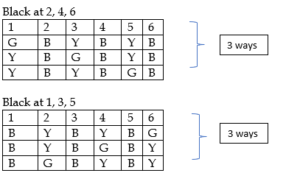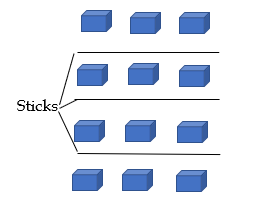| 1. How many different arrangements are possible for a line of flags consisting of one green flag, three black flags, and two yellow flags, given the following conditions: i. No two adjacent flags are of the same colour. ii. The flags at both ends of the line are of different colours. |
Easy |
| A. 8 B. 12 C. 6 D. None of these |
View Answer
Answer: Option C
Explanation:
_ _ _ _ _ _
1 2 3 4 5 6
The black flags will be placed on either even places (2, 4, 6) or odd places (1, 3, 5)

Total arrangements = 3+3 = 6
Alternatively
The 3 black flags can be place in 2 ways (either at odd numbered places or even numbered places). Corresponding to each such arrangement of black flags, 1 green and 2 yellow flags can be arranged in 3! /2! = 3 ways
Total number of ways = 2*3 = 6
| 2. In a game of chess, Alexa wants to place her two horses, such that one is on a white square, other on a black square, and the two horses must not lie in the same row or column. In how many ways can she do so? | Medium |
| A. 56 B. 768 C. 651 D. None of these |
View Answer
Answer: Option B
Explanation:
| B | W | B | W | B | W | B | W |
| W | B | W | B | W | B | W | B |
| B | W | B | W | B | W | B | W |
| W | B | W | B | W | B | W | B |
| B | W | B | W | B | W | B | W |
| W | B | W | B | W | B | W | B |
| B | W | B | W | B | W | B | W |
| W | B | W | B | W | B | W | B |
Alexa can first choose a white or a black square in 32 ways (as there are 32 black and 32 white squares).
Now, she can choose the square of other column which does not lie in the same row or column (as that of the square chosen above) in 24 ways.
Total number of ways = 32*24 = 768
| 3. What is the total number of solutions to a*b*c = 30, where a, b and c are positive integers? | Medium |
| A. 21 B. 27 C. 30 D. None of these |
View Answer
Answer: Option B
Explanation:
The total number of solutions depends on the number of ways in which 30 can be resolved into three factors, and further on the number of ways in which these respective factors can be arranged.
Now, 30 = 2*3*5
2, 3 and 5 can be arranged in 3 * 2* 1 = 6 ways
Similarly, 30 can be resolved in the following other ways:
(1*2*15), (1*3*10) and (1*5*6). For each of these ways, the factors can be arranged in 6 ways (as above).
Further, 30= 1*1*30
These 3 factors can be arranged in 3! /2! = 3 ways (as two factors are the same)
Total = 6+18+3 = 27
| 4. What is the sum of all the possible numbers of 4 digits formed by using the digits 3, 5, 5, 6 using each digit once? | Difficult |
| A. 63327 B. 57000 C. 256 D. None of these |
View Answer
Answer: Option A
Explanation:
Total number of different 4 digits formed by using three digits once = 4!/2! = 12
The numbers formed whose unit’s digit is 3 = 3
The numbers formed whose unit’s digit is 5 = 6
The numbers formed whose unit’s digit is 6 = 3
(same rule applicable for 10th, 100th and 1000th units)
Sum of the total number of units digit = (3*3)+(5*6)+(6*3) = 57
Sum of 10th digits = 57*10
Sum of 100th digits = 57*100
Sum of 1000th digits = 57*1000
Therefore, sum = 57(1+10+100+1000) = 63327
| 5. In an array organized by 12 students, there are 3 sticks—two black and one white. The students form rows of 3 each and hold the sticks in a way that the sticks are positioned between the rows, with 6 students holding each stick. Given that each student can take any position in the array, how many different arrangements are possible? | Medium |
| A. 12!*6 B. 12!*2 C. 12!*3 D. None of these |
View Answer
Answer: Option C
Explanation:

12 students can arrange themselves in 12! ways.
The 3 sticks, 2 of the same colour can be arranged in 3! /2! = 3 ways.
-> Total number of required ways = 12! *3
| 6. In how many ways can 6 pencils be distributed among 5 students if a student may get any number of pencils? | Easy |
| A. 15625 B. 7776 C. 625 D. None of these |
View Answer
Answer: Option A
Explanation:
Since the first pencil can be given to any of the 5 students, so the number of ways in which the first pencil can be given away = 5
In a similar manner, the second, third, fourth, fifth and sixth pencils can be given away in 5 ways each.
-> The required number of ways = 56 = 15625
| 7. In a specific entrance test pattern, there were 10 questions, each consisting of two parts: Part A and Part B. What is the total number of possible selections a student can make when answering one or more questions on the paper. Please note that the student must choose either Part A or Part B when attempting any question. | Medium |
| A. 59048 B. 19682 C. 999 D. None of these |
View Answer
Answer: Option A
Explanation:
For each of the 10 questions, a student can either omit it or do part A or part B. Hence 03 ways to tackle each question exist.
For 10 questions we have 310ways, Finally, subtract 1 to avoid the possibility of omitting all.
Required answer = 310 – 1 = 59048
| 8. How many 5-digit numbers can be formed by using all the digits (only once) 0, 2, 4, 7 and 5, such that the numbers are not divisible by 75? | Medium |
| A. 96 B. 82 C. 14 D. None of these |
View Answer
Answer: Option C
Explanation:
Total no. of numbers = 4*4*3*2*1 = 96 (because 1st place can’t be occupied by 0)
Divisibility by 75 means divisible by both 3 and 25 both.
All numbers formed with the given digits are divisible by 3 (because sum is 18).
For divisibility by 25 the rule is that the last two digits of the number should form a multiple of 25 i.e., 25, 75 or 50.
If last 02 digits are 25 then 2*2*1|2 5 -> there are 4 such numbers
If last 02 digits are 75 then 2*2*1|7 5 -> there are 4 such numbers
If last 02 digits are 50 then 3*2*1|5 0 -> there are 6 such numbers
Total numbers divisible by 25 = 4+4+6 = 14
Answer = 96-14 = 82
| 9. How many numbers less than 10000 can be constructed such that only the digits 5, 6, 7, 8, 9 are used in these numbers (repetitions allowed) and the numbers are divisible by four? | Difficult |
| A. 781 B. 650 C. 775 D. None of these |
View Answer
Answer: Option A
Explanation:
1-digit number will be 8 only i.e., 1
2-digit numbers will be such that the last two digits should form a multiple of 4 i.e., these numbers will end in 56, 68, 76, 88, 96 -> there will be 5 such numbers
3-digit numbers will be such that the last two digits can be occupied in 5 ways only, as these numbers have to end in 56, 68, 76, 88 or 96; and the first digit (hundredth place) can be occupied in 5 ways -> total number of such numbers = 5*5 =25
Now, 4-digit numbers = 5*5*5 = 125
5-digit numbers = 5*5*5*5 = 625
Total = 625+125+25+5+1 = 781
| 10. Let x be the number of different 4-digit numbers divisible by 3, formed with the digits 1, 2, 3, 4, 5 and 6 (repetition allowed). What is the value of x? | Difficult |
| A. 432 B. 1296 C. 648 D. None of these |
View Answer
Answer: Option A
Explanation:
Total numbers of 4-digit numbers = 64
Out of these, in every set of 6 numbers, we have 2 numbers divisible by 3, as shown below:
| 1111 | 1121 |
| 1112 | 1122 (divisible by 3) |
| 1113 (divisible by 3) | 1123 |
| 1114 | 1124 |
| 1115 | 1125 (divisible by 3) |
| 1116 (divisible by 3) | 1126 |
Now, in every 6 numbers, 2 numbers are divisible by 3
-> In every 64 numbers, those divisible by 3 = (2/6) *64 = 2*63 = 432
